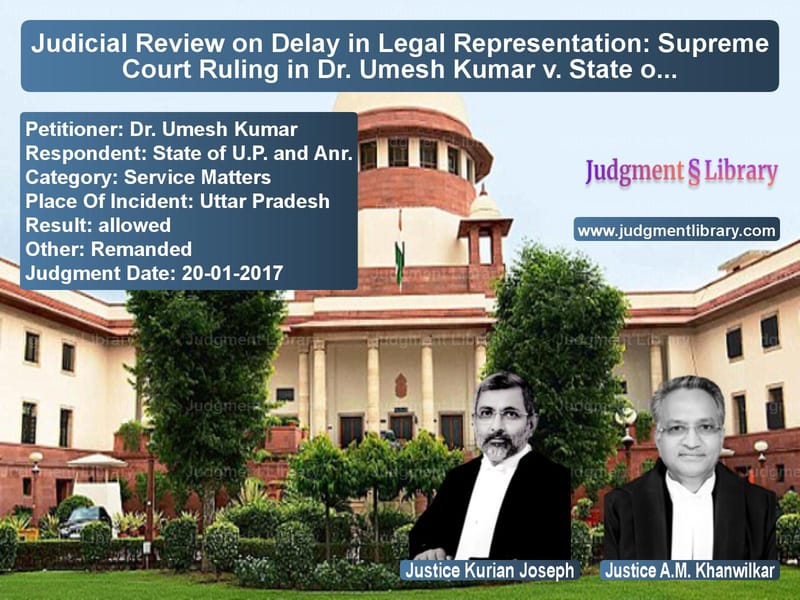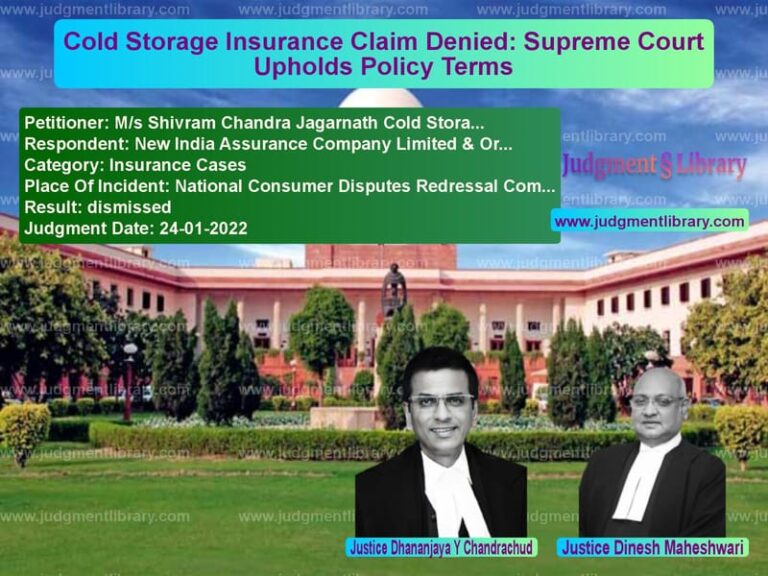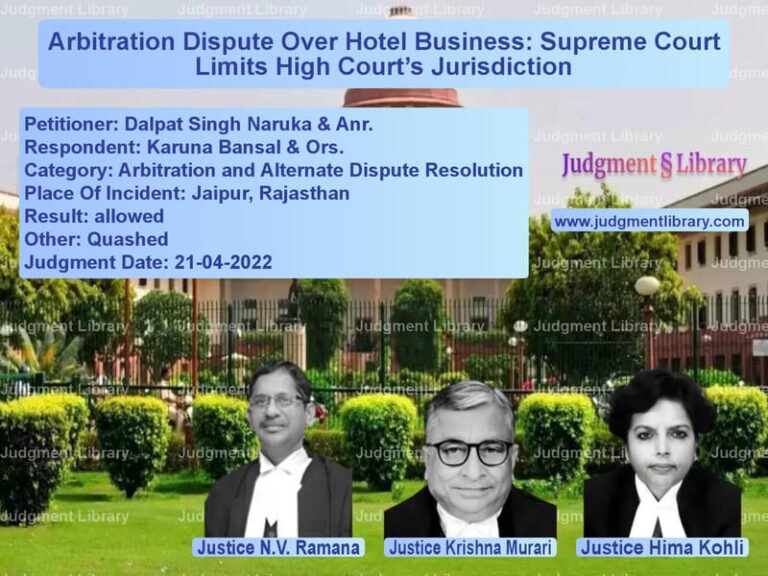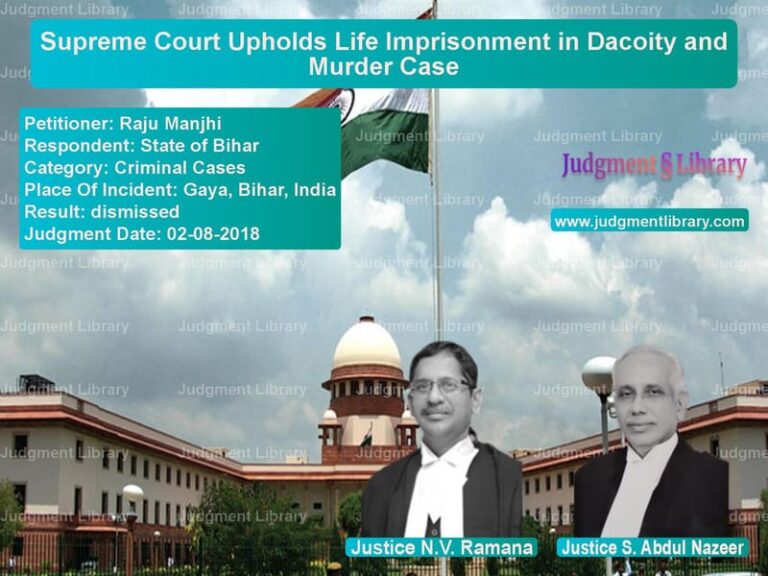Judicial Review on Delay in Legal Representation: Supreme Court Ruling in Dr. Umesh Kumar v. State of U.P.
Introduction
The Supreme Court of India, in the case of Dr. Umesh Kumar v. State of Uttar Pradesh & Anr., addressed an important legal issue related to delay in filing a petition. The case raised fundamental questions about whether a court can dismiss a petition solely on the ground of delay without considering the merits of the case. The ruling emphasized that procedural delays should not be the sole reason to deny justice, and every legal representation must be evaluated on its merits.
Background of the Case
The appellant, Dr. Umesh Kumar, had submitted a representation dated September 16, 2016, seeking consideration for placement. However, the High Court declined to entertain his petition solely on the ground that there was an unreasonable delay in approaching the court.
The appellant felt aggrieved by this dismissal and approached the Supreme Court, seeking a directive to the relevant authority to consider his representation on its own merits instead of rejecting it due to procedural delay.
Legal Issues Raised
- Can an individual’s legal representation be dismissed solely on the ground of delay?
- What are the legal standards for evaluating delay in filing a petition?
- Did the High Court err in denying the appellant’s plea without examining the merits?
Arguments by the Appellant (Dr. Umesh Kumar)
- The representation had been pending since September 16, 2016, and deserved to be considered on its own merits.
- The High Court had erroneously dismissed the plea without addressing the actual content of the representation.
- The delay in approaching the court should not have been the sole factor in rejecting his claim.
- The Constitution guarantees the right to seek legal remedy, and procedural delays should not prevent the enforcement of that right.
Arguments by the Respondents (State of U.P. and Anr.)
- The petition was dismissed by the High Court due to unexplained delay in filing.
- The appellant failed to approach the court in a timely manner, which led to the rejection of his case.
- Legal certainty requires that litigants approach the courts without undue delay, and allowing such late claims would set a bad precedent.
Supreme Court’s Judgment
The Supreme Court found that the High Court had unjustifiably dismissed the appellant’s plea based on delay. The Court held:
“Having gone through the averments in the petition and the representation, we find that there is no justification for non-suiting the appellant on the ground of delay.”
The Court further directed:
“The representation dated 16.09.2016 is pending before Respondent No.2. Therefore, without expressing any opinion on the merits of the case, this appeal is disposed of directing the Respondent No.2 to consider the representation dated 16.09.2016 on its own merits and pass appropriate orders thereon in accordance with law and communicate the same to the appellant within a period of three months.”
Key Takeaways from the Judgment
- Delay Alone Cannot Be the Basis for Dismissal: Courts must assess the merits of a case before rejecting it solely on the ground of delay.
- Right to Consideration: A pending representation must be reviewed by the appropriate authority in accordance with law.
- Legal Fairness: The ruling ensures that procedural delays do not unjustly deny individuals their right to be heard.
- Judicial Review: The Supreme Court reiterated that judicial review extends to procedural fairness and that courts should avoid blanket dismissals based on procedural technicalities.
Implications of the Judgment
The judgment reinforces that administrative and judicial authorities must evaluate cases based on merit rather than dismissing them solely due to procedural delays. It serves as an important precedent ensuring that technical grounds such as delay do not unfairly deny justice.
Legal Precedents Cited
The Supreme Court has consistently held in previous cases that:
- Delays in approaching the court should not automatically result in rejection of a petition unless they lead to prejudice against the opposing party.
- Administrative bodies are required to follow the principles of natural justice, which include considering representations fairly.
- Judicial discretion must be exercised judiciously, keeping in mind the facts of each case.
Practical Implications for Future Cases
This ruling has far-reaching consequences:
- It ensures that government authorities cannot refuse to consider pending applications merely on the ground of delay.
- It upholds the right to judicial review in cases where administrative authorities have failed to act on representations in a timely manner.
- It sets a benchmark for courts to carefully assess the reasons behind delays before dismissing a case outright.
Conclusion
The Supreme Court’s ruling in Dr. Umesh Kumar v. State of U.P. establishes that delay alone should not be a reason to deny consideration of a legal representation. This decision upholds the fundamental principle of justice that every plea should be considered on its own merit, ensuring fairness in judicial and administrative proceedings. It reaffirms that the right to legal remedy should not be curtailed by procedural delays and that courts must ensure that justice prevails over technicalities.
Don’t miss out on the full details! Download the complete judgment in PDF format below and gain valuable insights instantly!
Download Judgment: Dr. Umesh Kumar vs State of U.P. and An Supreme Court of India Judgment Dated 20-01-2017.pdf
Direct Downlaod Judgment: Direct downlaod this Judgment
See all petitions in Recruitment Policies
See all petitions in Judgment by Kurian Joseph
See all petitions in Judgment by A M Khanwilkar
See all petitions in allowed
See all petitions in Remanded
See all petitions in supreme court of India judgments January 2017
See all petitions in 2017 judgments
See all posts in Service Matters Category
See all allowed petitions in Service Matters Category
See all Dismissed petitions in Service Matters Category
See all partially allowed petitions in Service Matters Category







